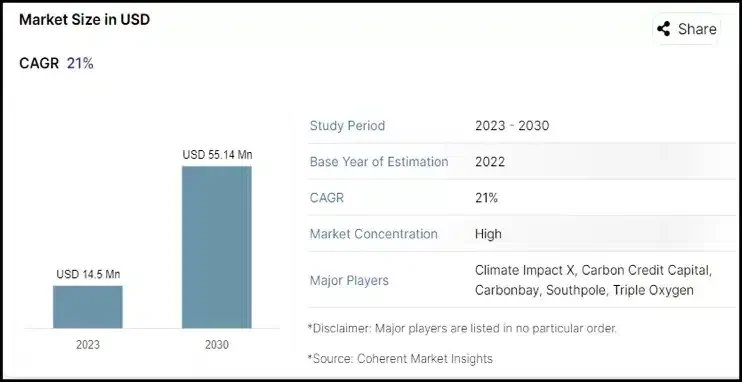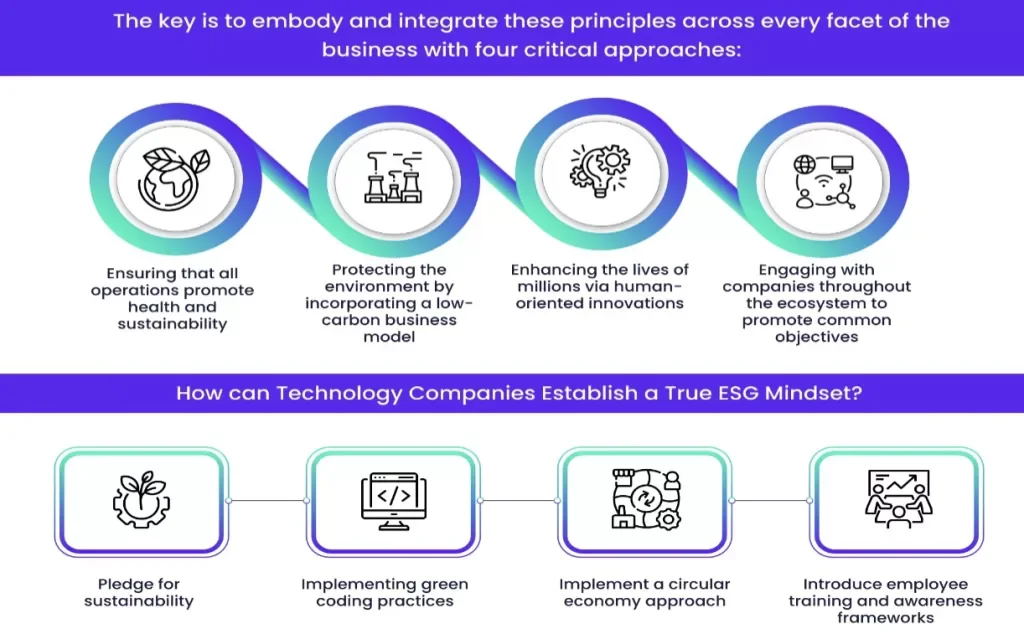Late last year, the Ministry of Sustainability, and the Environment (MSE) and the National Environment Agency (NEA) had rolled out the Eligibility Criteria under the International Carbon Credit (ICC) Framework. In accordance with Article 6 of the Paris Agreement, Singapore’s ICC Framework fosters global collaboration to attain climate sustainability objectives. Effective cooperation from international carbon markets will further boost Singapore’s goal achieve net zero emissions by 2050.
In 2023, the market size of Singapore’s Carbon Credit reached US$ 14.5 million. Current industry data shows that this is expected to jump to US$ 55.14 million by 2030, reflecting a compound annual growth rate (CAGR) of 21% from 2023 to 2030.
Take a quick look at the chart to know the market size and the major players.


Source: Coherent Market Insights
Moving on, we will deep dive into the analysis of the Singapore Carbon Credit Market, exploring its current status, key trends, and future prospects.
Singapore Carbon Credit Market – A Current Analysis
In December 2021, The Singapore Finance Minister Lawrence Wong stated:
“In many ways, we believe we are well-positioned to serve as a carbon services and trading hub for Southeast Asia and the Asia Pacific, given our foundation as a regional centre for professional services, commodity trading and financial services”.
He further added that the country is already home to more than 70 carbon services and trading firms that use Singapore as a base to serve the region and engage in carbon market activities.
Key factors fuelling the rise of Singapore’s carbon market are primarily attributed to the following:
- increasing awareness on climate change
- enforcement of government regulations
- and a focus on corporate sustainability commitments
Singapore relies heavily on renewable energy projects like solar, wind, and hydropower to propel its carbon credit demand. The market dynamics show that the Singapore government has implemented several initiatives to achieve its projected value of its domestic carbon credit market.
Government Regulations: The Carbon Pricing Act
The Carbon Pricing Act mandates the disclosure of greenhouse gas (GHG) emissions and imposes a tax linked to these emissions. Its objective is to incentivize businesses and industries to actively diminish their carbon footprint. Early in 2019, a carbon tax was set at $5 per tonne of CO₂ equivalent (tCO₂e) but to support the net-zero target, the tax is increased to S$25/tCO₂e in 2024 and 2025, and expected to rise to S$45/tCO₂e in 2026 and 2027 and S$50- S$80 by 2030.
The taxation system applies to all businesses emitting 25,000 tonnes or more of greenhouse gas each year. This further aligns with the estimated target to achieve $55.14 Million by 2030. Not only this, the government also focuses on Energy Efficiency Programs to encourage use of clean and renewable sources of energy.
And according to recent reports, the government has set a target to cut down 50% of carbon dioxide emissions by 2030 and achieve net zero emissions at the earliest by 2050.
Further Reading: Singapore Sets Higher Standards for International Carbon Credits
ESG Policies towards Decarbonization Commitments
The long term sustainability goals are shaped by an organization’s individual goals and values and geographic context. Priority is given to energy efficient cost savings, energy security, and advance to decarbonization. This is a collective commitment of the corporate sector to achieve net zero by 2050.
As per NCCS Singapore, the city currently hosts over 70 organizations offering carbon services, marking the highest concentration in Southeast Asia. Global corporations and local settings are investing resources to establish and fortify their carbon services platforms in the country.
One notable effort was put forward by GoNetZero who launched a one-stop digital solution for renewable energy certificates, carbon credits, and carbon management. Launched with support from EDB’s Corporate Venture Launchpad programme, GoNetZero secures partnerships with big and small businesses (renewable energy companies), helping them buy carbon credits and offer innovative data driven solutions to track their net zero efforts.
To name a few, KPMG, Sembcorp Industries, Microsoft, Global Centre for Maritime Decarbonization (GCMD), etc. play a significant role towards decarbonization in Singapore.
The following infographic clearly shows how technology can leverage ESG policies:


Source: sganalytics.com
Singapore’s Robust Carbon Trading Ecosystem
Firstly, Singapore’s dedication to environmental sustainability and its initiatives to advance carbon neutrality drives it to be in the mainstream market of carbon credit trading. Simply put, solid backing from the government creates a viable trading environment for carbon exchange.
With the implementation of the National Climate Change Strategy known as the Singapore Green Plan 2030, the city is setting standards high for a favourable carbon trading market.
Second, prominent market leaders in Singapore’s carbon credit market are Climate Impact X, Carbon Credit Capital, Carbonbay, South Pole, and Triple Oxygen. For example, in September 2022, Carbonbay introduced a revolutionary carbon trading and offsetting platform tailored for the Asia Pacific markets. This cutting-edge platform enables organizations to acquire carbon credits while actively participating in the advancement of regional offset projects.
The existence of these big players in Singapore offers a multitude of possibilities to buy, sell, and store carbon credits, thereby reinforcing their carbon ecosystem.
Live Streaming: The easiest way to promote carbon credit market
Live streaming can potentially contribute to the promotion and understanding of the carbon markets. It’s a direct interactive platform for analysts to discuss market trends, and policy changes, and provide insights into carbon credit prices. Given the dynamic nature of carbon markets, live discussions on policy developments, regulatory changes, and government initiatives can keep the audience informed about the evolving landscape.
Many tech companies and start-ups have already begun hosting virtual conferences or events related to the carbon market. This provides a platform for networking, collaboration, and exchange of ideas among participants.
With all said and done, Singapore is strategically positioned to emerge as a central hub for carbon services and trading in both Southeast Asia and the wider Asia Pacific region. Therefore, the goal to achieve the target of $55.14 million by 2030 with a 21% CAGR is very likely attainable.
Read More: Sylvera and Singapore Forge Path Towards High-Quality Carbon Credits
- SEO Powered Content & PR Distribution. Get Amplified Today.
- PlatoData.Network Vertical Generative Ai. Empower Yourself. Access Here.
- PlatoAiStream. Web3 Intelligence. Knowledge Amplified. Access Here.
- PlatoESG. Carbon, CleanTech, Energy, Environment, Solar, Waste Management. Access Here.
- PlatoHealth. Biotech and Clinical Trials Intelligence. Access Here.
- Source: https://carboncredits.com/singapores-carbon-credit-market-surging-at-21-cagr/



